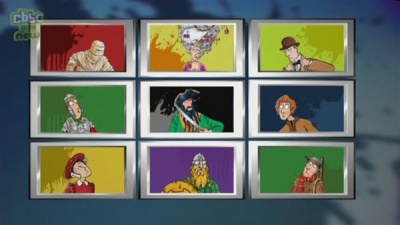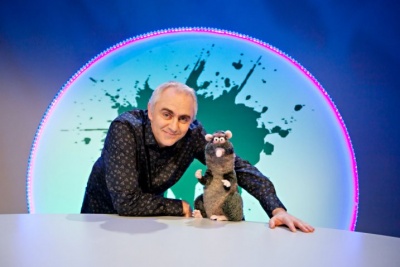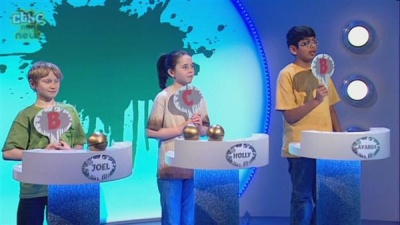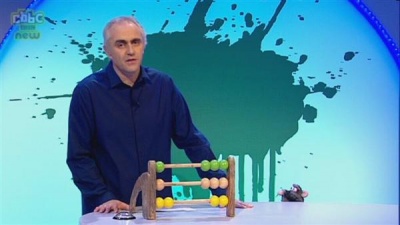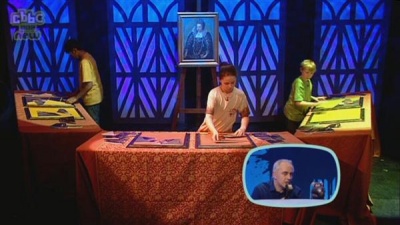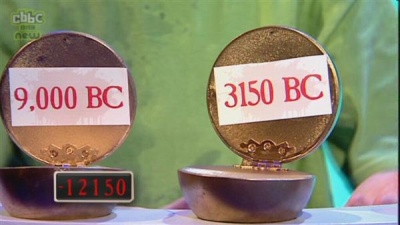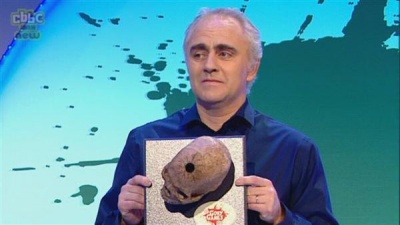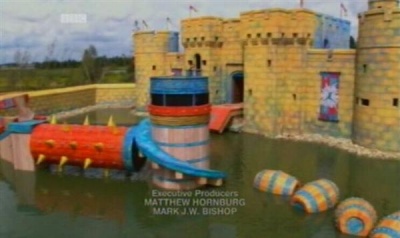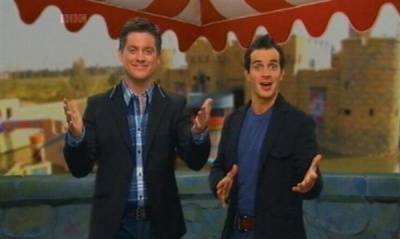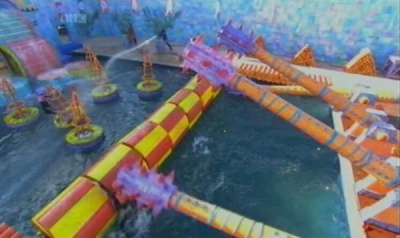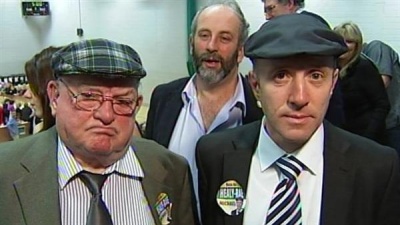Weaver's Week 2011-07-03
Last week | Weaver's Week Index | Next week
This week, we've mostly been watching CBBC. It was that or the Wimbledon Umbrella Exhibition. Later, we look at some people who got only slightly wetter than those folk in white, and we report into Ireland's premium-rate scandal. 0'898-gate, if you must.
Contents |
Horrible Histories: Gory Games
Citrus TV / Lion TV for CBBC, from 30 May
In the beginning, there was Horrible Histories. It was a show about the past, and a show with a difference. Most historical shows follow a linear narrative, going from event to event through history, as though the march of time is itself an irresistible force. Horrible Histories prefers tactics from modern military commanders: Snot and Augh.
Real life wasn't just about kings and princes, about struggles for supremacy. It's as much about defecating, about infectious diseases, about food and drink and pus and phlegm and all sorts of unusual punishments, most of them fatal. Horrible Histories jumps from era to era with reckless abandon, and it's deftly written with as much emphasis on humour as historical fact. Getting children to laugh is difficult; getting them to remember bits of history is difficult; combining the two seems like a doddle, so it's got to be even more difficult.
Horrible Histories has been noticed by The Critical Establishment, presumably because The Critical Establishment's precious daughter has been roaring her head off with laughter at the show. It was awarded Best Entertainment Programme at the comedy awards early in the year, the first time a children's programme had picked up a gong at these grown-up prizes – so grown-up that they're hosted by Jonathan Ross.
Now Horrible Histories has a spin-off quiz show, Gory Games. The opening title song warns that there's going to be lots of bodily functions, and suggests that if this isn't your thing, you might want to look away now. Already, Gory Games is establishing its outsider credentials, it's coming across as a bit edgy.
Gory Games closely follows two traditions of the children's game show genre. As is traditional on children's television, the host for proceedings is a hand-puppet animal. Rattus Rattus is a rat: not quite as cocky as former BBC Three controller Roland Rat, but he's clearly got designs on greater fame.
The other tradition is that every game show in the universe must employ someone who took their name from a piece of meat. Dave Lamb shoulders much of this burden, giving commentary on about 30 episodes of Come Dine with Me every hour, and – as we saw last week – nipping into Alexander Armstrong's basement to check some facts. On Gory Games, he'll actually be running the show, awarding points and giving the score. He'll also give a voice-over commentary to events elsewhere, so no change there.
Actually, we lie. Gory Games follows a third tradition of game shows, in that it has contestants and questions and answers. There are three contestants, we'll get to know them briefly at the start of the game, and by "briefly" we mean "name, location, random fact". More time is spent on Mr. Rattus and Dave's comedy cross-talk, entirely the right choice.
Round one is picked from nine possible eras of questions, ranging from the ancient Egyptians up to the Victorians. This being Horrible Histories, the ages are given alliterative names, such as the "Terrible Tudors". Each round consists of four questions, and the contestants will take it in turns to pick a question from those available. It only gives them an illusion of control, all four questions will end up being asked.
The responses are either true/false, or multiple choice A B C questions. Contestants indicate their preferred response by holding up a paddle giving the answer. It's a bit like that Channel 5 teatime filler 100%, only done on even less budget, which we thought was just about impossible. Most of the questions are asked by animated characters, though some are given by Mr. Rattus, sometimes with the assistance of Dave in a prop question.
Throughout the round, Dave tots up the scores on his high-technology computational machine, a device so powerful that it display any integer number between 0 and 4 in any of the contestants' colours, merely by the location of beads on a piece of wood. Whichever contestant has the most points on the abacus – and ties are broken by a buzzer question – gets two advantages. They're allowed to pick a Year Sphere, one of a dozen or so small round balls, spray painted gold, and concealing a year inside.
The winner of the round is also certain to play the physical challenge that follows. Some of these challenges are designated "all play" games, because all three contestants will play them; others are "solo play", and only the winner of the round will take part. "All play" games will always produce one or more winners, "solo play" games have the contender trying to meet a particular standard of performance, deemed a winning result.
But what are these games? Challenges such as reducing the risk of developing the plague, which (we now know) was spread by fleas living on rats. So if the contender can stop rats from moving about, perhaps by inflicting cranial damage, they'll be doing a good thing. Clonk 15 rats on the nut in two minutes to win another Year Sphere, then. Or have all three competitors pay homage to an Aztec deity by erecting a pyramid in her honour, a pyramid formed of shapes that have been broken up through the passage of time and need to be re-assembled.
All of these games are played down the Time Sewer, and are the subject of commentary by Dave and Mr. Rattus. Even the whack-a-rat game, the host's a professional like that. The Time Sewer itself is a pipe leading from the brightly-lit Gory Games studio to a darkened area, one that allows simple but effective sets to be erected and struck easily.
There are four rounds in the show: the final one deviates from the norm only by skipping the questions and moving straight to the challenge, which is an all-play game. It means that all of the competitors will take part in at least two of the physical challenges, ensuring they have a memorable day out at the studios.
Eventually, the time has come to open the Year Spheres, and total up the years inside. All of the years are historical dates, and most of them are dates AD, these are ADded to the player's total. Some of the spheres hide dates BC, which will be (er) suBtraCted from the total. It means that a player with none of the golden balls can still win the game, if the opposition gets enough BC dates. As well as the score, Dave will tell us what the historical date was. Education through serendipity.
What's the prize? Something small and disgusting, such as a piece of tissue paper (allegedly) used by Lady Jane Gray. Gory Games respects historical traditions, including the one that game shows on children's television are played for the fun, not for the prizes. All of the contestants have an unusual opportunity – get messy on national television, show off some of their more arcane knowledge, and appear with a national television megastar. And him off of Come Dine With Me.
Like its parent, Gory Games is funny, and educational without appearing to be. And they make it seem so effortless, which is the greatest achievement of all.
Splatalot
Marblemedia for YTV, CBBC, ABC3, since 13 June
It's now five years since Dick and Dom left the cosy confines of Da Bungalow, and what's become of them since? That's actually a genuine question, we're having difficulty remembering what the dynamic duo have been up to since emptying their last vat of creamy muck-muck.
Anyway, they're back, and they're back on the CBBC channel, providing a voiceover to this programme. It's made by YTV, as in YTV the Canadian children's channel. Not YTV the British station known for 3-2-1. None of the contestants or host will preface their contribution by humming the first bar of "On Ilkla' Moor baht 'at", or even the theme from Go With Noakes.
Each of the twelve contestants will preface their contribution with their battle cry. It can be something inspiring, "To infinity, and a bit further!" It could be something witty, "To infinity, and not quite getting there!" On occasion, it can be bizarre, "To infinity, six peas!" They'll then launch themselves into an obstacle course in the moat of a heavily-fortified mediaeval castle.
A heavily-fortified mediaeval castle? In Canada, a land where castles weren't constructed until the Europeans brought them over in the sixteenth century? And when mediaeval times ended in the fifteenth century? See, this is what happens when you watch Horrible Histories, you learn stuff. Like how this has to be a fake mediaeval castle, there aren't any real ones in the country. That, and the way it's got lots of useful camera positions, and some Defenders shooting custard pies and oversized mushy peas at the attackers. It's almost as if it's been constructed especially for television.
Anyway, contestants are encouraged to have a go at each obstacle, which requires them to keep their balance from point A to point B, while the path narrows and obstacles appear and while the Defenders shoot YTV vegetables at them. Should all this prove impossible, the contender will descend from the obstacle into the castle moat, and will need to swim to the next section.
Rinse and repeat this for all twelve contenders. The six to have completed the course in the fastest times get to the castle stockade, where they're challenged to climb up a ladder and wave their flag as if it were an overgrown hankie. A simple task, made only somewhat more difficult by the way that all the rungs of the latter are scattered around the castle courtyard, and positioned on the other side of revolving, foam-filled turntables. These contraptions spin round, and tend to deposit unsuspecting attackers in foam fired by three more Defenders.
Eventually, four competitors will scale the ladder and raise their flag, and they will progress to the castle courtyard. There, they must complete a further obstacle course, the first to do so will claim the Splatalot crown.
Now, we can tell this is a YTV production by the way there are lots of internal breaks, where we see the contenders still in, then Dick and Dom do something funny. And then, just in case we missed it when they said it almost fifteen seconds ago, they remind us of who the contestants are. Didn't they just say that about fifteen seconds ago?
Inevitably, this show attracts comparisons with evening programme Total Wipeout, not least because the opening round features a lot of people falling in the water. Oh, he done fell in the water. Splatalot has four advantages over Wipeout, and two of them are Dick and Dom. Not only are there two people giving commentary, but they're actual comedians, people who are funny for a living. The regular Wipeout host, Richard Hammond, is entertaining without being funny.
Another of Splatalot's advantages is that it has some vague semblance of a plot. There is a certain logic to storming a castle, from the moat to the outer walls to the inner courtyard. Wipeout just has a lot of people falling in the water for no reason other than it's there. The final advantage: Splatalot is over in 25 minutes, less time than it takes Wipeout to complete its opening round. These are reasons why we resisted the early temptation to copy-and-paste the Wipeout review from last year.
Splatalot never pretends to more than unthinking entertainment, and has more going for it than some other shows we could mention.
News From Ireland
Questions to which the answer is "No", number 696 in a series: Are we to believe the Irish edition of the Daily Mail? Its Tuesday edition claimed that there had been vote-rigging from the Dáil. This non-story goes back to RTÉ's "People In Need of Assistance" charity fundraiser in 2007, and its flagship show Celebrities Go Wild. Eight Irish celebrities were sent into the wild west of the island to tramp through undergrowth for a week, return to the warm interviews of presenter Anna Nolan, and suffer the usual sort of televoting arrangement: not entirely fair. According to the paper, precisely 3636 votes were cast from inside the Irish parliament building in favour of competitor Michael Healy-Rae. The paper also notes, with remarkable precision, that this cost €2639.
Michael's father, Jackie Healy-Rae (Ind, Kerry South) was a TD at the time, and his son has since succeeded in parliament. Both Healy-Rae father and son were elected by promising to put Kerry first, to act as the county's voice in the national parliament. Many commentators find this sort of localism an irritant, and argue that it distracts from the national government. Others suggest that it's an entirely reasonable check and balance on a government from many miles away.
The Irish Daily Mail isn't actually saying that Healy-Rae senior cast thousands of votes for Healy-Rae junior, but that's the impression it gives its readers. Does the paper have evidence that the family rigged the vote in their favour? Does it even have evidence that these votes meant Mr. Healy-Rae won over Michelle de Bruin (swimmer)?
On this last point, no it doesn't. RTÉ no longer has the phone records to establish where calls originated, seeing as how all this took place three-and-a-half years ago. The broadcaster has got better things to do than keep detailed phone records just on the off-chance they could substantiate a rival media company's non-story. It also said that Healy-Rae would have won even if all the calls were disqualified.
Eamon Gilmore (Tánaiste, LP) said that it might be necessary for an enquiry to be established. That's yet another enquiry, paid for by taxpayers, in a building where there are already more enquiries than members to serve on them, or tax money to pay for them. Sean Barrett (Ceann Comhairle) added that the €2639 should be paid back, hoping no-one would notice it wasn't clear who should pay it back. Jackie Healy-Rae is no longer a member of parliament, and no-one's offered evidence that he was directly responsible for making calls from the parliament building anyway.
Jackie Healy-Rae did ask his work colleagues to consider voting for his son, but that's it. Ned O'Sullivan (FF) said that he'd voted for Michael Healy-Rae, and some of the calls could have come from a parliamentary phone. It was so long ago he couldn't remember specifics. In the event, Michael Healy-Rae, who clearly couldn't have placed thousands of calls in Dublin seeing as how he was in the middle of nowhere, said he'd pay the money out of his own pocket. Having extracted their pound of flesh, or their €2639 of money, the papers shut up and found something else to fume about.
This discussion asks questions about how well the Oireachtas officials scrutinise expense claims. It calls into question the honour of a current and a former member of parliament. And, from this side of the water, it smells like yet another attempt by populist Dublin rabble-rousers to smear a hardworking family from Kerry, beyond the Pale. What conclusions can we draw from this affair? We don't know; on this, we report, you decide. Answers on a postcard marked "Actually, can we have Anna Nolan host Big Brother?" to the usual address.
This Week And Next
A sponsorship deal was announced for the forthcoming Antan Dec vehicle Red or Black?. The sponsor's press spokey said, "With its fast-paced, edge of your seat format, we know that viewers are going to be glued to their screens and while they're deciding Red or Black at home. The home is our point of sale so unmissable TV events such as Red or Black create an ideal time for a product." By which we think they mean, "We're sponsoring Red or Black, and we sell something. And we'll say anything to get our product's name in the papers, no matter how little sense it makes."
Ratings in the week to 19 June show The Apprentice clearly in the lead, 8.4m saw Wednesday's show. Who Dares Wins came second with 5m, and Penn & Teller's Fool Us finished third, 4.05m saw the magic. Odd One In returned to 3.5m viewers, but The Marriage Ref failed to make ITV's top 30, no more than 2.7m tuned in – we do know 215,000 saw it on ITV+1. The Apprentice You're Fired led BBC2's lists, with 3.25m viewers, plus 210,000 on BBC-HD; Come Dine With Me had 2.25m as Channel 4's biggest game show.
On purely digital channels, Britain's Got Talent Us debuted on ITV2 with 880,000 people gawping at people with an unsustainably high opinion of themselves, and Piers Morgan. Come Dine With Me on More4 attracted 865,000, and CBBC's Splatalot had 410,000 muck-muck fans asking "Where's the muck-muck?". Sunday was a good knight for Sir Brucie of Forsyth, 135,000 on Challenge to Play Your Cards Right.
The highlight of this week is the return of Quote... Unquote (Radio 4, 1.30 Monday), a show itself seen on the new run of Antiques Master (BBC2, 8.30 Monday). University Challenge is also back (BBC2, 8pm Monday), and there's a new run of Britain and Ireland's Next Top Model (UKTV Living, 9pm Monday). The summer schedules are upon us, and ITV has another cookery game show in Ten Mile Menu (2pm weekdays). The Weakest Link (BBC2, 4.30 weekdays) is back, and so is Pointless Celebrities (BBC1, 5.15 weekdays), but not in the places we left them. Dave has International Dragons' Den week (7pm weekdays), with episodes from Canada, Ireland, and a foreign-language version. And if you're near a television set at 7.10 next Saturday, do be careful, as Tonight's the Night returns for a third, death-defying, series. You could be watching a Total Wipe Us Out marathon on UKTV Dave...
To have Weaver's Week emailed to you on publication day, receive our exclusive TV roundup of the game shows in the week ahead, and chat to other ukgameshows.com readers, sign up to our Yahoo! Group.


